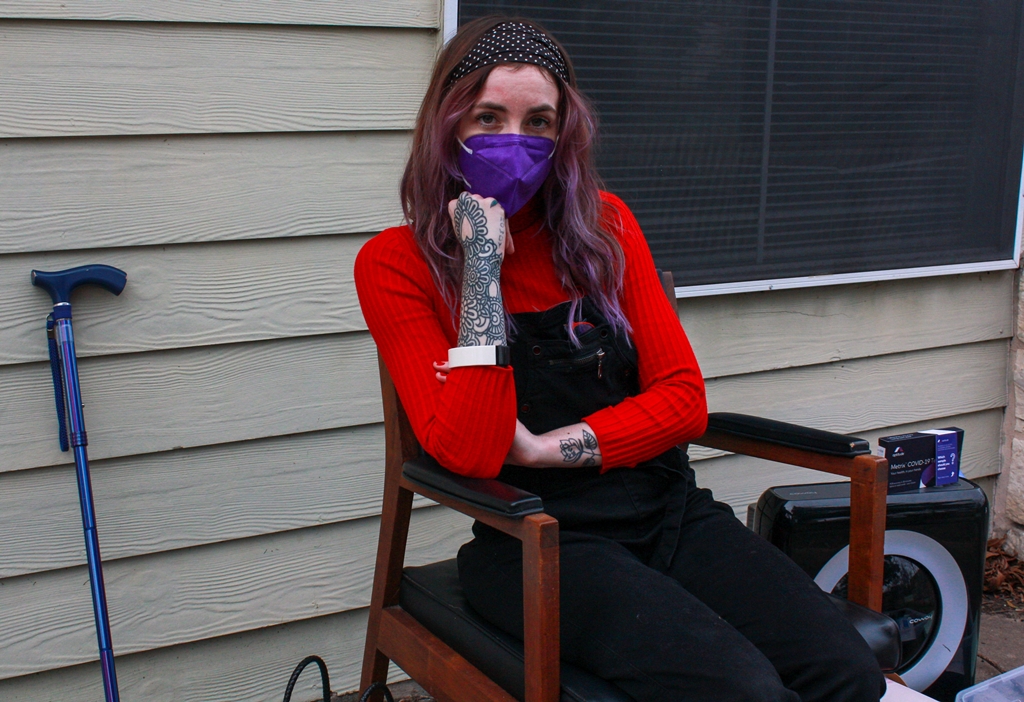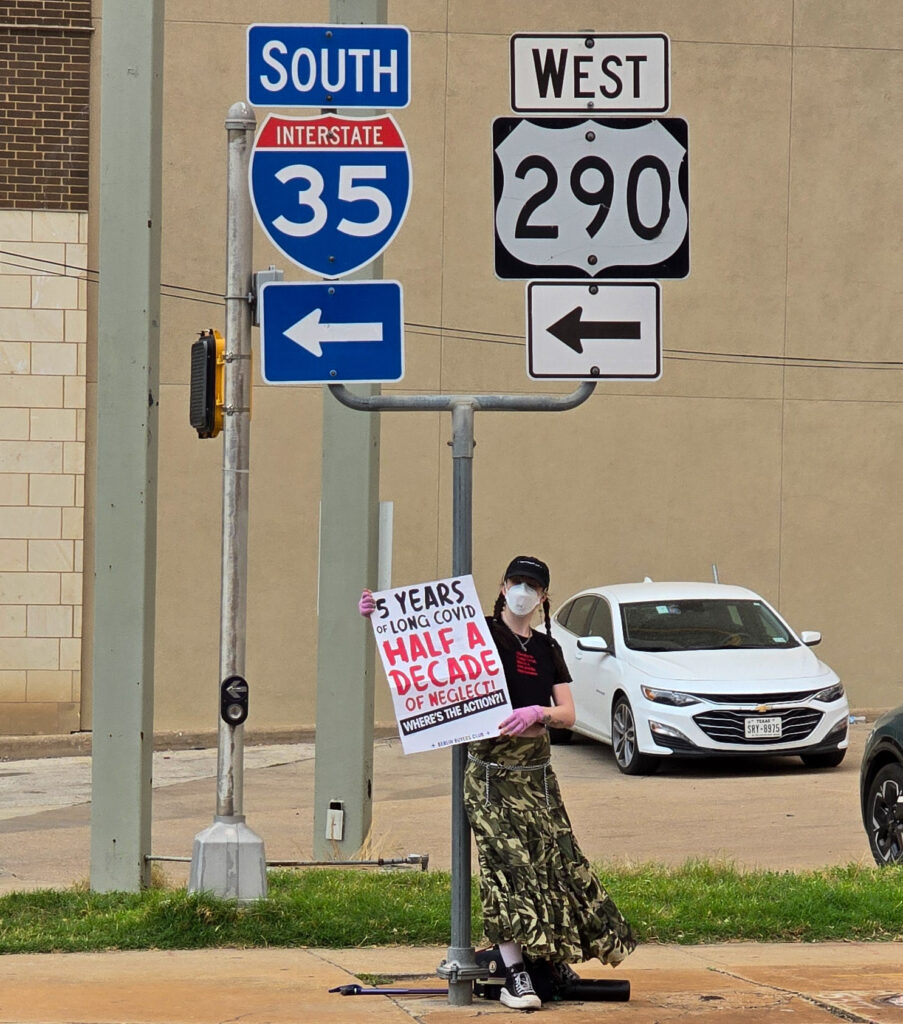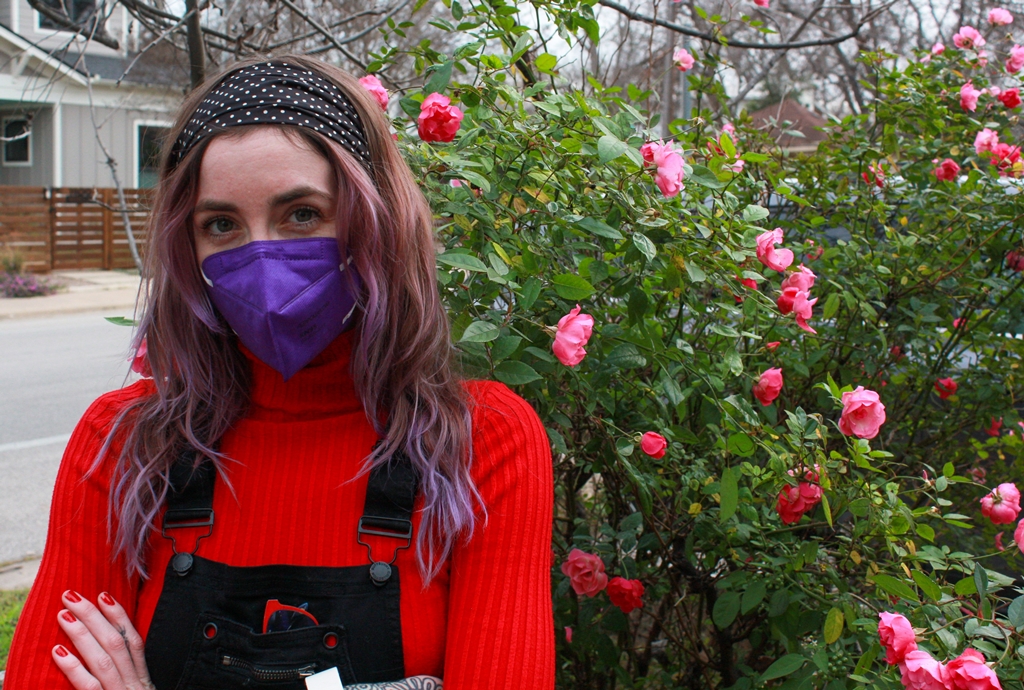KD Drackert is one of my favorite people in Austin; to be honest, I think I have an “activist crush” on them. What I mean is, I just adore everything she does and wish more people knew about their work. So I thought this month I’d share my full interview with KD, from March of this year. We spoke after a banner drop she organized, which was the hook for my Deceleration article about mask blocs and Long Covid activism. Earlier, KD also appeared in my Texas Observer magazine feature on Long COVID.
I also just think it’s terribly important to keep this issue in the public awareness, especially as the Trump regime begins to dismantle access to vaccines and other public health measures. Sadly, I feel like the American left doesn’t put enough emphasis on these issues, whether it’s access to universal healthcare or the importance of improving air quality in public places. That’s why I admire the work that Clear The Air ATX, mask blocs and similar mutual aid groups do so much, and feel it’s so important to amplify their work.
We held this interview on the patio of a noisy bar, while I sipped on a THC-laced beverage, the kind Dan Patrick is so offended about. But my transcription software saved the day, turning useless audio into useful text.
My supporters on Patreon made this interview possible. Become a member to keep me creating more stories like this one.
This conversation has been edited for length and clarity.
*

My name is KD Drackert. Pronouns, they/she, she/they, depends on the day. I am the founder of Clear The Air ATX, a Long COVID advocate and an artist.
Kit O’Connell: Tell me more about Clear the Air, what you provide and how active y’all are.
KD: Clear The Air ATX is an air purifier lending library, and we focus on giving our gear to artists, musicians and organizers in the Austin area in order to help make their events safer. We also offer masks and far-UVC devices as well to help mitigate the spread of COVID in our community. And as of right now, I believe we have seven or eight purifiers, give or take, and then two sets of far-UVC, and we’ve distributed 1000s of masks at this point.
KO: Far-UVC are those devices I’ve seen you set up around you on stage, when you talk?
KD: Yeah. Far-UVC will sanitize a certain amount of the air in an area. Far-UVC has been around and used in hospitals, but they finally figured out a way to do it at a low enough dose to where it’s safe for humans to be around, because they would essentially, before this came out, they would, like, “nuke” a hospital room and nobody could be in there. But now far-UVC is safe for people.
KO: We’re about five years into the pandemic now, what’s your big picture take on where we are, with it and Long COVID awareness?
KD: Five years into Long COVID, and right now we are still lacking awareness publicly. I recently heard the stat that 1/3 of people in the United States do not know that Long COVID exists. And you would think that five years in when this illness impacts 400 million people globally, we would all know what Long COVID is. So there’s still an awareness that’s lacking.
You could say research is pretty decent in the sense that it has been studied a lot, but there’s a lot of critiques from patients about the quality of the research happening, and there’s a lot of advocates saying patients’ voices need to be more centered in the way that research is structured. So that it’s actually more accessible for people that are sick. I know I myself, when I’ve done clinical trials, have struggled with accessibility.
KO: Like being able to get to the clinic reliably?
KD: Yeah, being able to get to the clinic, or just the amount of communication, I suppose. The amount of visits, not doing certain stuff virtually when you know they probably could. Yeah, there’s a lot of critiques on that.
Under this current administration, I am pretty concerned about where Long COVID is about to go. I know that RFK has said before his confirmation hearing that he would do stuff for Long COVID, but I don’t trust him, and I know many, many, many long haulers do not trust him. We still have no cure, no approved treatments, a lot of discrimination happens to long haulers, and a lot of stigma that we have that we endure regularly.
[KO’s note: This conversation took place before RFK, Jr began directly attacking COVID vaccine access.]
KO: For RFK, “helping” could do more harm than good potentially, right?
KD, laughing: Yeah. RFK, his idea of helping might be like, doing a coffee enema or something.
Well, there’s a very harmful thing that a lot of doctors still push for people with long COVID, in particular people with long COVID that have chronic fatigue.
KO: You’re talking about graded exercise therapy?
KD: Yeah. A lot of doctors are pushing graded exercise for Long COVID patients. And if somebody with Long COVID has ME/CFS or chronic fatigue syndrome, doing exercise can worsen their condition and potentially, like the worst case scenario, leave them permanently bed bound. So it is really unsafe for doctors to be telling patients to do this. But ME/CFS is a post viral illness that has existed before COVID, and so you know, people with ME/CFS that predate COVID have been experiencing this shit that long haulers are newly experiencing.
KO: Do you mind talking about your day-to-day life as a long hauler?
KD: My day-to-day is different. It just depends on a lot of factors that are out of my control, like my endometriosis, the way it interacts with my Long COVID can worsen my fatigue in a really severe way. I should say I consider myself to have mild to moderate Long COVID, just depending on the time of the month. What I’m able to do is not representative of what most or all long haulers can do.
So some days like I can leave the house and run errands and be moderately — well, not in comparison to my old self — but I could be moderately active in that I could leave the house for a few hours, maybe go sit at a park — not hike like I used to — but at least sit at a park and chill. And then there are days like yesterday where I only get out of bed to feed myself and go to the bathroom and take my dog outside. And there are times where I can’t have any stimulation, no phone, no music, no movies. I just have to lay in silence in the dark. Some days I could have “mild symptoms” and only have three symptoms. Some days I could have upwards of seven plus symptoms.
KO: Has it improved or changed over time?
KD: I think my Long COVID has changed over time. One thing that’s been scary for me is that I will just suddenly get new symptoms out of nowhere. And that’s happened multiple times. I’ve also had multiple brand new diagnoses.
But for example, in March of last year, I was just brushing my teeth, and then my blood pressure dropped. I felt like I was gonna pass out and then I was in a severe flare for about six weeks, and then I just never fully recovered from that flare, and that permanently altered my baseline. I was able to do a lot more before that crash in March. The thing that did help me improve a bit was EECP therapy.
KO: That’s a heart treatment, right?
KD: Yeah. It’s a treatment where it grows blood vessels in your heart and in your brain.
KO: Have you done that more than once?
KD: No, I want to do it again, though. I need to do it again after that baseline crash. But, had I not done EECP, that crash I had last March probably would have left me bedbound, to be honest, but I had regained some energy from EECP. So I think that gave me some wiggle room for a baseline crash. That’s a constant worry I live with — is there gonna be a stressful event that triggers a severe, baseline altering crash to where I become housebound or bedbound. I just never, I just never know.
Having this illness has made me feel like I have to live my life to the fullest, because I just don’t know when new symptoms are gonna come up. I don’t know when I’m gonna be better or worse in the long term. And so it’s definitely given me more of an acceptance of who I am and what I want, and not really giving a fuck about what other people think. Because I feel like I have nothing to lose.
KO: That treatment, I assume it’s not covered by insurance?
KD: No, the EECP therapy I did was not covered by insurance. The clinic I went to had a financial aid program, and because I was so broke, they covered 80%, but it still cost me $2,000 which is a lot when you’re broke. I ended up having to crowd fund for that, because [my energy] crashed after the treatment, and then I ended up getting better and better and better. But the treatment was really intense because I did it alone. I was driving myself across town in rush hour traffic five times a week, and going to school and somehow still working. So it makes sense, I had a crash. But no, EECP is not financially accessible to most people.
I was in the IVIG clinical trial. IVIG is really promising for a good chunk of Long COVID patients, but because it’s not approved, insurance really refuses to cover it unless somebody is really, really, really severe. But even then, my doctors told me they still have trouble getting it covered, and it’s at least $10,000 per dose.
KO: It’s like a ‘biological’ treatment?
KD: IVIG, it’s an intravenous fluid they give you of other people’s immunoglobulins that they pull from plasma. It’s really expensive, and I was in the clinical trial for it, and it was a double blind, but I’m like 99% sure that I was getting the medication. And I actually got kicked out of that clinical trial because the clinic didn’t want to accommodate me within the parameters of the trial, and they wanted me in and out faster, and I was slow to get infusions, and so they manipulated my notes and kicked me out, so now I just don’t have access to that medicine anymore.

KO: So, in addition to RFK, we also have Trump making these threats against people wearing masks at protests. There’s more talk of mask bans, which I know is not just a Republican thing, but they’re the noisiest about it.
KD: Well, the Democrat silence is just amplifying the Republicans’ hate-filled messages around masking.
KO: Your safety depends on masking in places, how do you feel about that threat?
KD: I think people think I’m being dramatic when I say that if I continue to get COVID, endlessly, I will die. I will die a much earlier death than I would like. I want to live a long time, which means I need to be able to wear a mask. So it is like actually threatening my ability to live my life, which is ironic, because all of the anti-mask arguments are that “you need to be able to live your life.” And I’m like, “Oh, well, speak for yourself.”
I mean, it’s very typical for them in their love of their obsession with pseudoscience. It’s really dangerous, because what they’re doing is criminalizing and demonizing a medical device, and if that’s something they’re willing to do, what is the next medical device?
And then, the left and Democrats, which I know are not the same, but anybody that is not identifying as a far-right person, all of their silence and all of their refusal to mask just keeps us in this high-threat space. And I worry the louder that Trump gets with his anti-mask stuff and tying it to criminals, people are going to start becoming more violent towards the few of us that do still mask, which is why we need people to step up and join us.
KO: You talked about how multiple infections are going to shorten your life. I just want to emphasize that that’s true for everybody, right? Yes, you’re maybe more vulnerable because you’re already sick, but the science is very clear that repeated infections aren’t good for anybody.
KD: Well, yeah, and the thing, too, is that asymptomatic infections still cause damage, and we’re seeing these young people just drop dead. It’s skyrocketing the amount of people that have disabilities, and young people are having strokes and blood clots and all of these mysterious things. They just don’t know why, but it all connects. Sure, it could not be COVID triggering this, but getting COVID certainly isn’t helping. But there’s plenty of data showing that COVID does heighten and cause these things as well.
One issue I’ve had, having Long COVID and advocating for Long COVID awareness and masking is that people perceive it as a problem unique to myself. They don’t understand that this is a collective issue that they are a part of. That has created this weird dynamic where people are like, “Oh my god, I’m so sorry you’re going through this. That’s so hard.” And then they’ll go do whatever maskless thing. And I’m like, wait, no, this isn’t just about me. This is about you too. So I think it’s just so stigmatized, which is why I’m so loud about it, because I’m not gonna be shamed into silence. I was already in the closet once. I’m not doing it again.
KO: You touched on this a little bit already, but obviously the Republicans are openly hostile. But the left has really been a failure in terms of helping with this too. Progressives, far-left, all that. Masking is just not an issue I hear people talk about outside the disability community.
KD: I know some disabled people quite literally cannot mask, I think of Alice Wong.
KO: Such an icon!
KD: She can’t mask, which is why everybody that can mask, should mask, to protect people like Alice and and newborns who can’t mask, because they’re newborns. I almost appreciate, in a sense, the right’s vitriol, because with the left and Democrats I get this faux pity and or people say “Oh, well, my mental health. I need to protect my mental health [by not masking or taking precautions].” I try to tell people COVID causes new mental health issues. It gave me depression. I didn’t even just get depression from Long COVID, because of the social impact, it quite literally changed the way my brain worked.
KO: You were not susceptible to depression before Long COVID?
KD: No. I just had anxiety. I didn’t have depression. And now I understand what people mean when they talk about having depression. “Oh, this is very different!”
But the left acts like they want Equality and Liberation and Justice for everyone, and that revolution isn’t happening if it’s not accessible. The Revolution isn’t happening if you don’t listen to some of your most vulnerable members. And when we consider that trans people are some of the most impacted by Long COVID, and people are screaming about protecting trans lives, and then you connect that to masking … It’s just this severe, severe avoidance that is being wrapped in this performative pity that then just causes them to be complacent and quiet. I hope that was an okay answer, because I could fucking rage on this topic. I could talk about that for an hour. That shit, it pisses me off.
KO: What reaction do you think you’ve had to Clear The Air ATX, has that helped turn things around at all in Austin?
KD: What clear the air is doing is not only acting as the mutual aid lending library, but we do provide public health education, and then I provide a personalized experience and some education as an individual through my own platform, and it has made a difference. As far as I am aware, there were not mask-required events happening before Clear The Air came around. There were people masking. And people pretty much stopped masking around here in 2021.
Now that Clear The Air is here, we’ve had conversations with some event producers and some community members, and we provide the resources to make it accessible. There’s been a minor shift in some of the culture with people, at minimum, at least, adding the layer of purification. But it’s been cool to see some people have mask-required events again. So it’s not at the level that we need it to be. But I mean, you gotta start somewhere.
One other thing I wanted to touch on, medically, that I think particularly the queer community needs to come to terms with, is that it’s been shown that COVID and Long COVID can deplete your T-cells, and that COVID and Long COVID is very similar to HIV. So, we are ignoring our own history and our elders that fought really hard by refusing to become educated about this and see the similarities to HIV and AIDS. And you know, that scares me for my future, but that’s a tidbit of information I think people really need to know.
